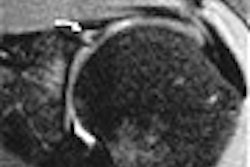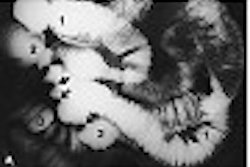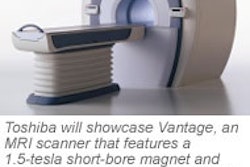Can undergoing MRI have a therapeutic effect? Massachusetts researchers have found that a particular exam frequently improved the mood of bipolar psychiatric patients -- results that weren't replicated when different exams were performed or normal controls were scanned.
Researchers at the McLean Hospital in Belmont started a prospective pilot study after noticing that depressed bipolar patients who were undergoing echo-planar magnetic resonance spectroscopic imaging (EP-MRSI) as part of a medication study felt much better after their scans -- an effect that sometimes lasted for several days (American Journal of Psychiatry, January 2004, Vol. 161:1, pp. 93-98).
However, the findings shouldn’t prompt any new demand for MR scanners. The effect appears to come from the acoustic frequency magnetic field generated by MRI scanners using the EP-MRSI protocol. But the effect can also be produced by much smaller systems that have no imaging capability, said lead author Michael Rohan, an imaging physicist with the Harvard-affiliated hospital.
And while the study raises questions about MR’s presumed lack of effect on patients, the mood-lift phenomenon appears specific to the EP-MRSI protocol provided to McLean by two researchers at the University of Washington in Seattle: Dr. Stephen Dager, a professor of psychiatry and radiology, and Seth Friedman, Ph.D., an assistant professor of radiology.
"Given that neuronal conduction processes occur on millisecond time scales, we hypothesize that the monophasic pulses delivered at 1 kHz in this EP-MRSI system, which are on the same time scale as neuronal processes, may interact with these processes," the authors wrote.
"McLean Hospital is a psychiatric hospital and has performed more than 10,000 MRI and echo-planar imaging MRI examinations of psychiatric subjects over the last 10 years, before the use of the EP-MRSI examination, without observing a similar effect," they wrote.
Although the researchers stumbled onto MR's therapeutic potential, the finding isn’t a complete surprise given that repetitive transcranial magnetic stimulation (rTMS) has already been used to treat depressed psychiatric patients. Both EP-MRSI and rTMS both subject the brain to time-varying magnetic and electric fields, the authors note.
Studies of rTMS have found that 40%-50% of depressed patients respond to the treatments with a 50% or greater reduction in depression as measured on the Hamilton scale, the authors wrote.
EP-MRSI generated even better results in the small McLean study, reducing depression in 23 of 30 (77%) of the bipolar patients. The scan boosted the moods of 63% of patients who were already on some sort of medication such as lithium, and in 100% of the patients whose bipolar disorder was unmedicated.
In contrast, only three of the 10 bipolar patients who received fake EP-MRSI scans reported a mood improvement, as did just four of the 14 healthy controls who received actual EP-MRSI.
"A placebo effect is thought to be unlikely because the subjects were not aware that the EP-MRSI examination itself was being tested for mood effects," the authors wrote. "The relative lack of mood improvement in healthy subjects who had EP-MRSI examinations (29% of healthy subjects responded) is consistent with results in rTMS studies."
All of the exams were conducted at the McLean Hospital Brain Imaging Center on a 1.5-tesla Signa scanner, 5.8 EchoSpeed version (GE Medical Systems, Waukesha, WI). The "sham exams" consisted of 3-D spoiled gradient-echo scans that took the same amount of time as the EP-MRSI.
The researchers cited several limitations to their study, including logistical issues that limited the number of sham examinations and the inclusion of patients who were already participating in an existing study. "The consistent and statistically significant rates of reported mood improvement, however, suggest that a significant neurobiological effect was present," the authors stated.
In addition to potentially better results, EP-MRSI avoids some of the negative aspects of rTMS treatments, which include scalp pain from the coil apparatus and a small risk of seizure.
According to the researchers, the 0.7 V/m electric fields generated by the EP-MRSI scan were smaller than the 1-500 V/m fields used in rTMS treatment of depression. The fields also extended uniformly throughout the head, unlike the highly nonuniform fields used in rTMS.
In addition, the EP-MRSI waveform is a 1-kHz train of monophasic trapezoidal gradient pulses, which differs from that used in rTMS.
Despite the statistically significant results generated in studies, rTMS has never progressed to widespread clinical use because its effects are too inconsistent, Rohan said.
To further study the mood-lifting effect of EP-MRSI, Rohan's team developed a small, head-sized system with no imaging capability. Rohan doubts that an MR manufacturer would be interested in marketing such a unit.
"The MR manufacturers are specialists in creating very complex systems, and very high-end systems," noted Rohan. "When it comes down to it, our device is not very complicated," he says, noting that it took a single electrical engineer just two months to make his patented table-top system.
Rohan said he expected further studies to show that only a very narrow range of very weak magnetic fields will reduce depression.
"I think we found a very special niche in the brain that we managed to fit this into," Rohan said. "We were lucky to find it, because I think if we were searching for it we never would have found it."
That said, the finding that MR has any impact on any patients may raise concerns about the modality, he said.
"I think there may be a little bit of work to identify what scans may have this kind of effect, and block them out," Rohan said. "That’s speculation of course; the FDA is the one to make those kinds of decisions."
By Tracie L. ThompsonAuntMinnie.com staff writer
January 15, 2004
Related Reading
MR spectroscopy may predict disease progression in MS, December 8, 2003
Do meds to slow dementia really work? MRS may hold the answer, September 12, 2003
Illuminating the mind: Imaging explores the mysteries of meditation, September 11, 2003
Researchers use diffusion imaging to trace connections in human brain, July 15, 2003
Functional MRI shows effects of antidepressants, February 28, 2003
Copyright © 2004 AuntMinnie.com




















